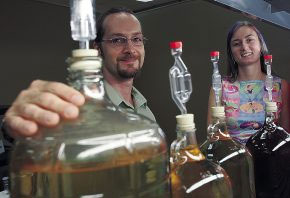 The Alternative Fuel Vehicle Institute’s “Biofuels Drive Economic Solutions Forum” in Las Vegas this month will feature an automotive journalist and an energy expert as keynote speakers.
The Alternative Fuel Vehicle Institute’s “Biofuels Drive Economic Solutions Forum” in Las Vegas this month will feature an automotive journalist and an energy expert as keynote speakers.
According to an AFVi news release, Michael Caudill, automotive journalist for KTLA in Los Angeles, and expert on the vehicle marketplace kicks off the morning with his insightful automotive forecast. Nationally recognized energy icon, David Freeman is the keynote lunch speaker.
The Forum focus is on biodiesel and E85 and is designed as part of AFVi’s Learning Marketplace to introduce fleets and other decision-makers to a wide range of information on the fuels, the vehicles, and available incentives. Supporting sponsors for the event are the Ethanol Promotion and Information Council (EPIC) and the National Biodiesel Board (NBB).
The Forum runs from 8:00 a.m. to 5:00 p.m. on Thursday, September 20 at The Orleans in Las Vegas. Registration is $199 and available on-line here.



 In an effort to get back on the road, Shared Route… a colorful, biodiesel bus that runs between Portland, Oregon and Olympia and Seattle, Washington… will run on vegetable oil.
In an effort to get back on the road, Shared Route… a colorful, biodiesel bus that runs between Portland, Oregon and Olympia and Seattle, Washington… will run on vegetable oil. “I understand it’s an uphill battle, and I’m going to stay in the fight,” said ITAC Engineers & Constructors Senior Vice President Rick Starnes, a key player in the project who spent more than 20 hours last week walking Brentwood to discuss the plant with residents. “I wouldn’t work this hard if I didn’t think this was the right project for this area.”
“I understand it’s an uphill battle, and I’m going to stay in the fight,” said ITAC Engineers & Constructors Senior Vice President Rick Starnes, a key player in the project who spent more than 20 hours last week walking Brentwood to discuss the plant with residents. “I wouldn’t work this hard if I didn’t think this was the right project for this area.”

 The exective director of the
The exective director of the  Blume, who sounds like one pretty interesting character, is the author of a soon-to-be-released book called “Alcohol Can Be A Gas,” subtitled Fueling an Ethanol Revolution for the 21st Century.
Blume, who sounds like one pretty interesting character, is the author of a soon-to-be-released book called “Alcohol Can Be A Gas,” subtitled Fueling an Ethanol Revolution for the 21st Century.  The
The  NEVC Executive Director Phil Lampert says these include some of the most popular vehicle models. “From a humble beginning of less than 500 FFVs in 1993, we expect that more than 750,000 such FFVs will be produced in the coming year,” he said.
NEVC Executive Director Phil Lampert says these include some of the most popular vehicle models. “From a humble beginning of less than 500 FFVs in 1993, we expect that more than 750,000 such FFVs will be produced in the coming year,” he said. Metro Transit… the public transportation service for the Minneapolis-St. Paul metro area… is raising the amount of biodiesel it is using in its vehicles to a 10% blend. For the last 14 months, Metro Transit has been using a 5% blend.
Metro Transit… the public transportation service for the Minneapolis-St. Paul metro area… is raising the amount of biodiesel it is using in its vehicles to a 10% blend. For the last 14 months, Metro Transit has been using a 5% blend.